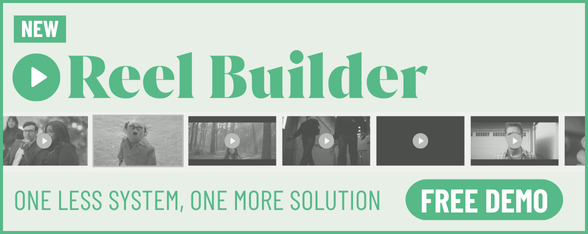
How Hamburg’s ZWEI Music Is Bringing Hollywood Scores to Adland

Simon Heeger and Christian Vorländer have been wanting to kickstart their own company since they first met 11 years ago at music college in the Dutch town of Enschede. Both German natives, their careers since have seen them work in both adland and the movie business, with Simon most recently spending time at Yessian and Christian working as a composer on Mad Max: Fury Road, as well as working with composer Hans Zimmer.
At the beginning of 2016 the long-time friends bit the bullet and launched ZWEI Music (TWO Music), a boutique music production company in Hamburg of two employees (themselves). LBB’s Addison Capper caught up with them to find out more.
LBB> What kind of role did music play in your lives as kids?
SIMON> Music always was an important part of my life. My father, who played in a Dixieland band, was able to play every instrument there is, which I was very impressed by. Growing up, I loved to record stuff with my keyboard, which eventually brought me to create my first beats.
CHRISTIAN> Same with me, music was always important to me, especially when I had to stop playing soccer due to an injury. My musical career started with playing the piano and the guitar. Eventually I started making beats, and participated in remix contests. When I won the first contest, I figured I wasn’t actually so bad at it.
LBB> Where did the two of you meet and why do you think you work well together?
SIMON> We met during our studies in Enschede. We’ve been best buddies ever since and just love hanging out and making music together. We both have very individual talents that work well together. I’m a bit more organised and Christian is the creative genius in our little shop.
LBB> Christian, you recently worked with Hans Zimmer and played a big role in Mad Max. Simon, you were most recently at Yessian. How do your film / advertising backgrounds feed into and inspire the work you do at Zwei?
CHRISTIAN> Making music for a feature film and composing for commercials isn’t so different after all. You’ve got to transport visual emotions into music – it doesn’t matter if that’s for 30 seconds or 90 minutes. Other than that, we’re both used to very long hours and very tight deadlines, which is crucial in both film and commercials.
LBB> What inspired you both to launch your own company? How is it unique compared to others?
SIMON> We both had the dream of creating our own company ever since we met 11 years ago in Enschede. Working as an employee can be good at a certain time in your life, but once you have the urge of creating something of your own, it’s hard to stop that thought. Christian came back from LA in May 2015. I believe I quit Yessian within a week.
LBB> How is your company unique compared to others?
CHRISTIAN> Our biggest USP is that we don’t only do commercial work, but are also involved in big feature films. From our experience, ad people love film score in their commercials and are impressed by our diverse showreel. On the other hand, Hollywood filmmakers love working with ‘foreign’, European composers. I guess the grass is always greener on the other side!
LBB> What have you learned since setting the company up?
SIMON> Bookkeeping sucks!
CHRISTIAN> Yeah, that sums it up quite well. There’s a lot more to it than just making music now. But it’s also a lot of fun looking for the right studio, buying furniture and writing estimates and offers, as you know you do it all for yourself and for the benefit of the company.
LBB> Which projects that you’ve worked on so far are you most proud of and why?
CHRISTIAN> We’ve been fortunate to have done a large amount of work within just a few months. Every project is unique and special in its own way, but if I had to pick one, I’d say it’s the work we did for FILA. Next to the fact that we love how the film turned out, it was our very first job as ZWEI, and it was directed by our good friend Andreas Roth, who believed in us even though we’d just started. Talking about films, I’m very proud of working on Mad Max: Fury Road as a composer. It’s such a great film and the director George Miller is simply amazing.
LBB> At the moment, the company is named Two and only has two employees - yourselves. Do you work with freelancers too? And do you have plans to expand?
SIMON> Although we compose music for most of our jobs ourselves, sometimes it’s just hard talking to clients, keeping books (ugh…), and creating music. So yes, we do work with freelance composers every once in a while. Luckily we have a lot of great friends from LA and the Netherlands who are just amazing composers. It’s always best to work with people you like and know you can trust. In the future, we definitely want to hire a music producer, so we can focus even more on creating music again.
CHRISTIAN> Additionally, we’re planning on opening an LA office early next year. Since most of the film projects we work on are based in Hollywood, it just makes sense to have a representation of ZWEI in LA, too. We still want to keep our base in Hamburg though – especially as we just moved into a great new studio, right next to the ‘Elbphilharmonie’ in Hamburg’s ‘HafenCity’.
LBB> Far too often in advertising, music is left to a last minute decision. Why is it important to get involved earlier in the process?
SIMON> A lot of times, the editor or director just takes a reference track to cut the film to. Then the client falls in love with it, finds out that he can’t afford it, and asks us to do something very similar to the reference. On top of the fact that of course we’d like to create something unique, a composer can never just re-create the reference, and therefore, the client will never be completely happy.
CHRISTIAN> One clue we took from the film world was creating musical suites before the edit and giving it to the cutter. Once he has a rough offline version, we finish up the music and there’s no risk of having to create a sound-alike from a reference track.
LBB> What are the biggest challenges facing the advertising music business right now?
SIMON> I think one of the problems is that music houses too often see themselves as competitors instead of working together on a simple goal: pointing out the quality and price of good music. We’re all in the same boat after all.
LBB> Any parting thoughts?
SIMON> Come by and visit us in Hamburg! We have an awesome new waterfront studio and just a bought a ping-pong table. Wanna challenge us?















